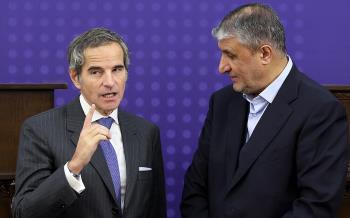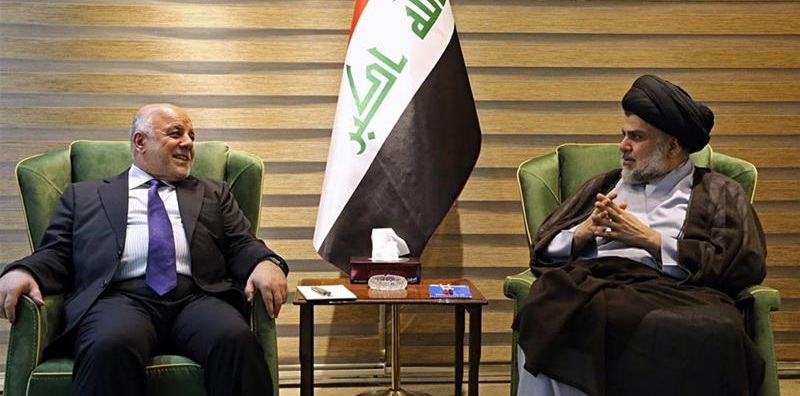Alwaght- The weeks that followed the parliamentary election in Iraq have borne promising news for the West Asian nation. Saeroon Coalition led by Sayed Muqtada al-Sadr announced an alliance with Hadi al-Amiri-led Fatah Coalition on June 13. And on Saturday, Saeroon staged an alliance also with Nasr Coalition, led by serving Prime Minister Haider Al-Abadi. The alliances are forming against the backdrop of a huge political fervor that engulfed Iraq’s politics after the May 12 vote.
The fervor stemmed from concerns grown by some political sides who feared the election may not immediately lead to the formation of a government and the country may slide into a political limbo similar to that of 2010. But things seem to go smooth. Upon the results announcement, Saeroon coalesced with Al-Wataniya List, led by the former PM Ayad Alwai and Hekmah Movement, headed by Sayyed Ammar al-Hakim. The new partnership was named Parental Alliance.
Fresh partnerships continued to come to existence, this time between the top-ranker Saeroon and the second place holder Fatah. And in the last station, al-Sadr and al-Abadi told of their coalition, hence paving the way for a majority at the parliament.
Al-Sadr office published a statement recently, saying that Nasr and Saeroon sealed their deals in 8 clauses as follows:
1- Encouraging a non-sectarian alliance to cover all Iraqi factions
2- Fighting corruption, dismissing the corrupt figures from state posts and prosecuting them. And empowering the supervisory institutions.
3- Forming a technocratic cabinet that is not based on the power-sharing system
4- Strengthening police, security forces, and army, and restricting the arms in their hands and preserving the government’s achievements against terrorism
5- Staging a reforms program to ensure an economic boost
6- Establishing balanced relations with all countries in favor of national interests and preventing foreign intervention
7- Reforming and supporting the judiciary and empowering the Supreme Court
8- Protecting national unity and sovereignty and guaranteeing smooth power transition
With all these in mind, how will Sadr-Abadi alliance influence the course of developments in Iraq? And what messages will it send to the Iraqi society in the present conditions? Three issues bear answers to the questions.
Failure of US strategy in Iraq
The main signal the alliance sends is that the US plans have failed to meet their goals in post-ISIS Iraq. In the days that preceded the parliamentary election, Americans heavily struggled to shape a government close to Washington in the war-ravaged nation and sought a full sway over a new cabinet. But the polls delivered the reverse. Responding to rise of their old foes, Americans mobilized their force to forge a camp against the emerging anti-Washington front.
The initial plan was to exploit Saeroon instrumentally to isolate the forces close to Iran. But the June 13 Fatah-Saeroon alliance announcement played havoc with the White House arrangements. Washington’s next move was creating a camp parallel to al-Sadr and al-Amiri’s partnership. But next developments proved that this was simply a pipe dream. The June 23 Saeroon- Abadi coalition formation was yet another blow to the foothold-seeking Americans, pouring cold water on their hopes to prospectively be able to influentially manipulate things in the Iraqi politics.
Many analysts deem the US an actor devoid of power to play a role in post-ISIS Iraq. Obviously exhibiting unwillingness to ally with the Americans, the Iraqi election victors have indirectly shouted a big no to the US meddling in their country.
No gaps among Shiite forces
Several months before the election, some media outlets and political figures purposefully developed theories about existence of a huge gap among the Shiite factions in Iraq. Their theories painted deep chasms between al-Sadr and other major Shiite factions. Others talked about heavy hostility between al-Abadi and Nouri al-Maliki, the former PM and one of Islamic Dawa Shiite party. They suggested that al-Sadr was at loggerheads with many close-to-Iran Shiite factions and unwilling to work with them under any conditions. More theories put al-Maliki and al-Abadi face to face, despite their being fellow party members. All these suppositions aimed to draw a conclusion: Post-election Iraq will witness a bipolar or multi-polar Shiite body.
But the pre-election hypotheses are turning out to be wrong as the Shiite forces are in their way to an immense coalition with a potentially big role in the future socio-political developments. The Sadr-Hakim-Maliki alliance makes a point clear: The Shiites are not divided when it comes to the strategic levels, and minor differences are tactical and passing.
Iraq departure from ethno-political polarization
Abadi-Sadr alliance is extraordinarily beneficial not only for the Shiites but also the whole Iraqis. As two political leaders, al-Sadr and al-Abadi have been encouraging departure from ethno-political divergence. Now they are mobilizing their closely-related pro-unity agendas under the umbrella of a coalition, something marking a prelude to a transition from sectarianism. A statement followed their meeting kept the doors open for all of the victorious parties to come on board. It is highly likely that factions affiliated with Sunnis, Kurds, and Turkmens will join the new union in the near future as it works as a landmark alliance since 2003 carrying the nation beyond the sectarianism lines.



























